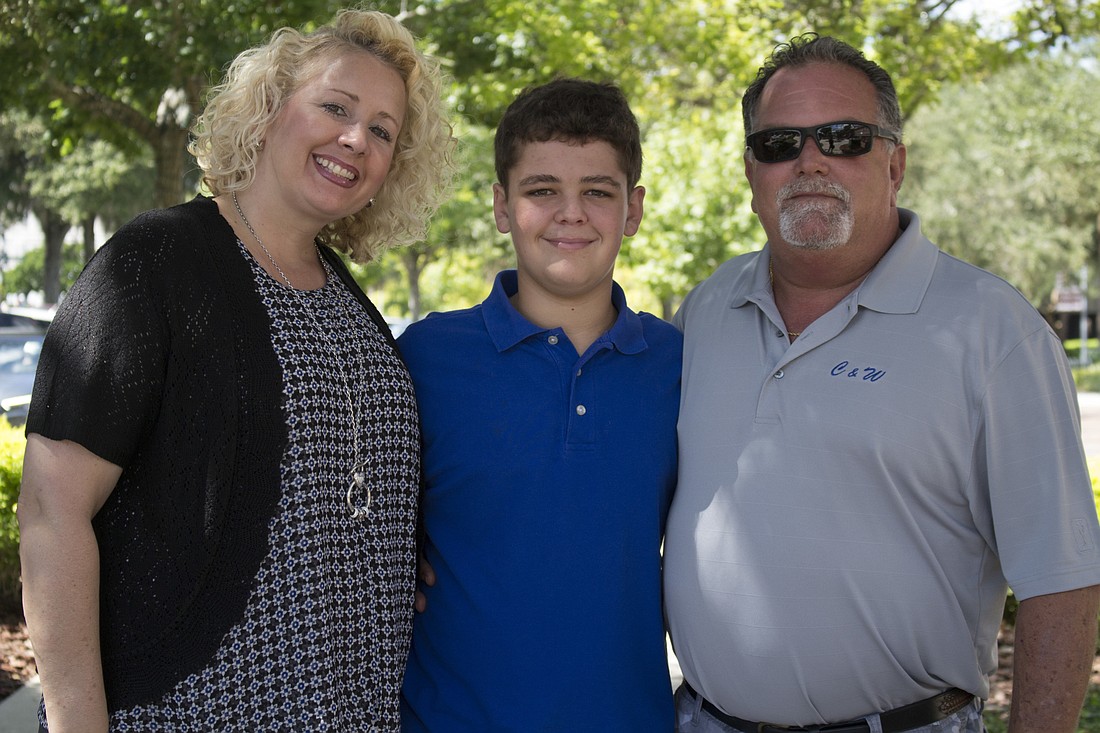- July 26, 2024
-
-
Loading

Loading

Riley Desin, a 15-year-old who likes to play basketball and attends 10th grade at Foundation Academy, has lost count of all the surgeries he’s endured since he was a baby.
Born with hereditary multiple exostoses, a bone growth disorder that causes bumpy bone growths to develop during childhood and early adolescence, Riley Desin has had what his parents, Rick and Tina Desin, estimate to be 10 to 15 surgeries since he was first diagnosed at 14 months old.
“I was a wreck because this was my baby,” Tina Desin said. “Whereas (Rick Desin) — you know you’re sitting there waiting for the doctor looking at all these kids come in with braces or crippled or severely handicapped — and (he) looked at it from the point of view that it could be much worse. But, as a mother, at that point in time it was very hard for me to look at it that way.”
For Riley, this was life as he knew it. He has a severe case of the condition. Given the knowledge of his family’s medical history, which shows no one else with the genetic mutation, his doctors believe it was caused by a spontaneous genetic mutation.
The condition can cause various problems, ranging from limb-length discrepancies to joint and mobility issues. If a growth presses on a nerve, it can cause severe pain. Doctors usually remove the growths if they cause serious issues. At one point, a bone growth on one of Riley’s arms concentrated too much pressure on an adjacent bone, causing his arm to bow out instead of remain straight. He’s since had multiple surgeries in an attempt to correct it.
Riley sometimes spends several weeks in recovery from the chronic surgeries, some of which required him to use a wheelchair or have both arms wrapped in casts. When he returns to school after surgeries with scars on him, he usually receives many questions from his classmates about what happened, but he doesn’t mind.
His most recent surgery was Aug. 4, just a week before the 2016 school year began. He had three-year-old plates removed from his knees meant to help strengthen his legs, which led to him attending his first week of school in a wheelchair. He said the most challenging parts of living with his condition are the leg surgeries.
“When I got my plates in, that was probably the worst one,” Riley said of his surgeries. “I kept on throwing up from anesthesia, and the surgery and recovery part of it was really the worst part, because I’d wake up in the middle of the night with a lot of pain for no reason.”
Although the Desin family has resided in Winter Garden for a decade, Riley Desin attends Shriners Hospitals for Children in Tampa for his medical care because it specializes in orthopedic care and accepts all patients, regardless of their ability to pay. His parents are grateful for the staff.
“When he was diagnosed at 14 months old, we knew from that time he had bone growths from his head to his toes,” Tina Desin said. “We knew he was going to face a lifetime of surgeries, and, you know, we both work, and we have medical insurance, but when you’re a middle-class family faced with that maximum out-of-pocket every single year, it really can be devastating. So to have something like this, we’ll never have to worry about medical care for him for his disability. It’s a humongous blessing.”
Although he has been a patient ambassador for Shriners for several years, Riley Desin was chosen to be the standard bearer representative for the first time in the 2016 Shriners Hospitals for Children Open, a PGA golf tournament in Las Vegas from Oct. 31 to Nov. 6.
With the support of his hospital and his doctor, they are optimistic about Riley’s future. Once his bones stop growing, he will not form any new growths. Existing growths could continue to cause issues throughout adulthood, but Riley reminds himself circumstances could be worse.
“It’s not really that hard,” Riley said. “The hardest part is ... having surgery, but when I go to the hospital, I look at other kids, and I know I don’t have it as bad.”
––––
Contact Gabby Baquero at [email protected].